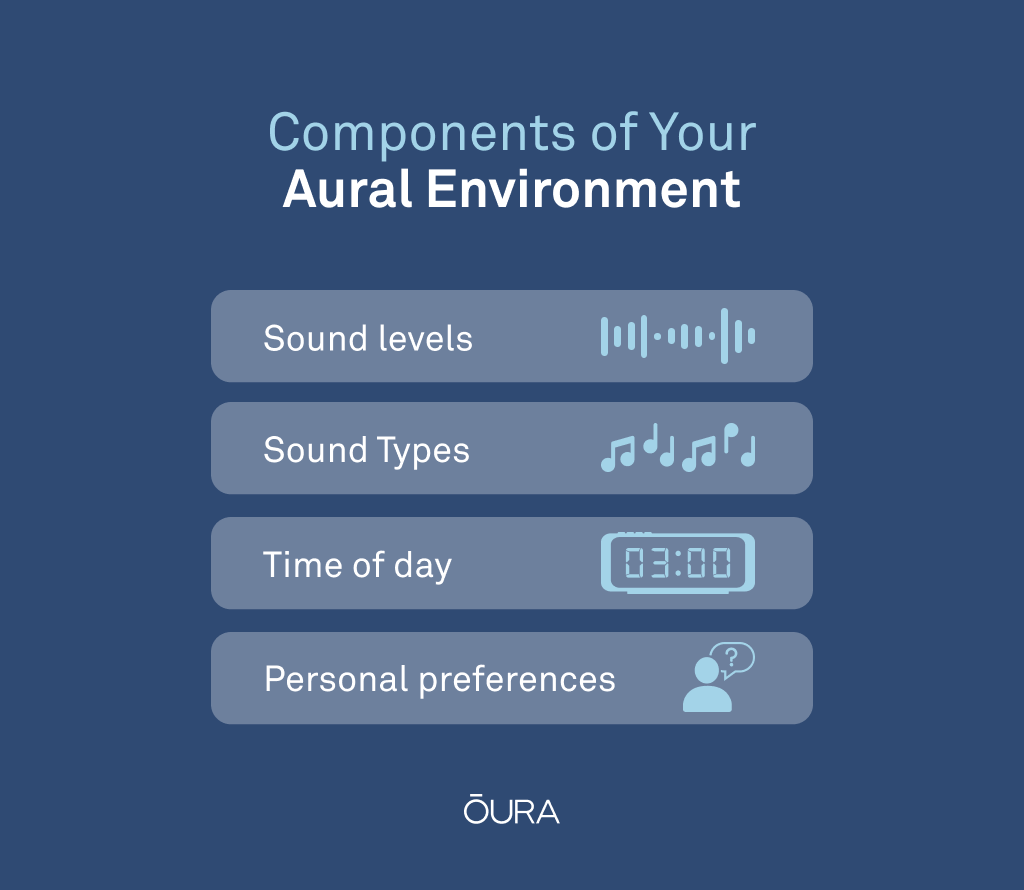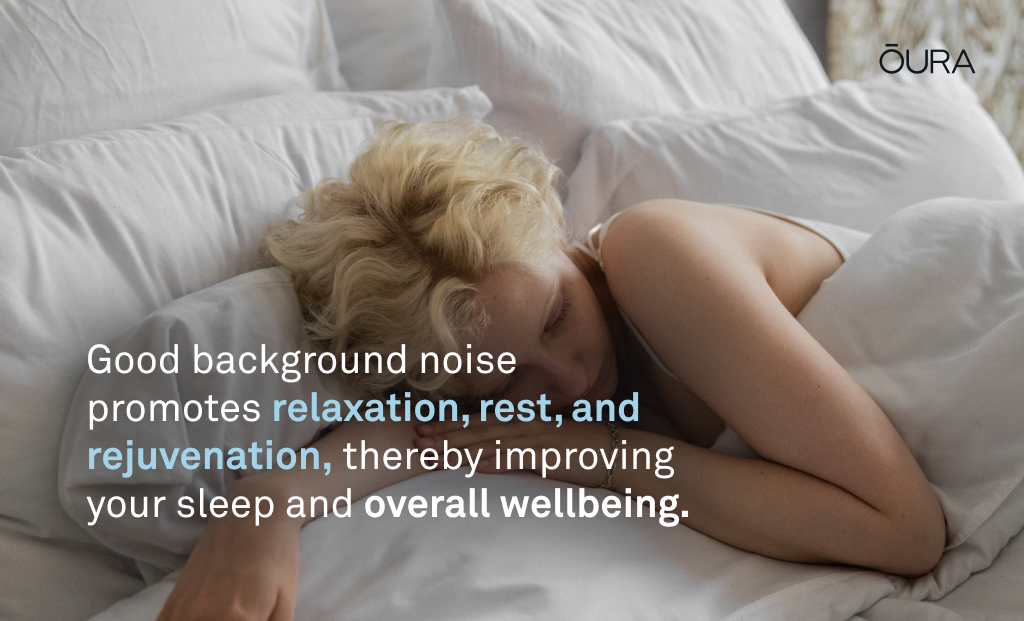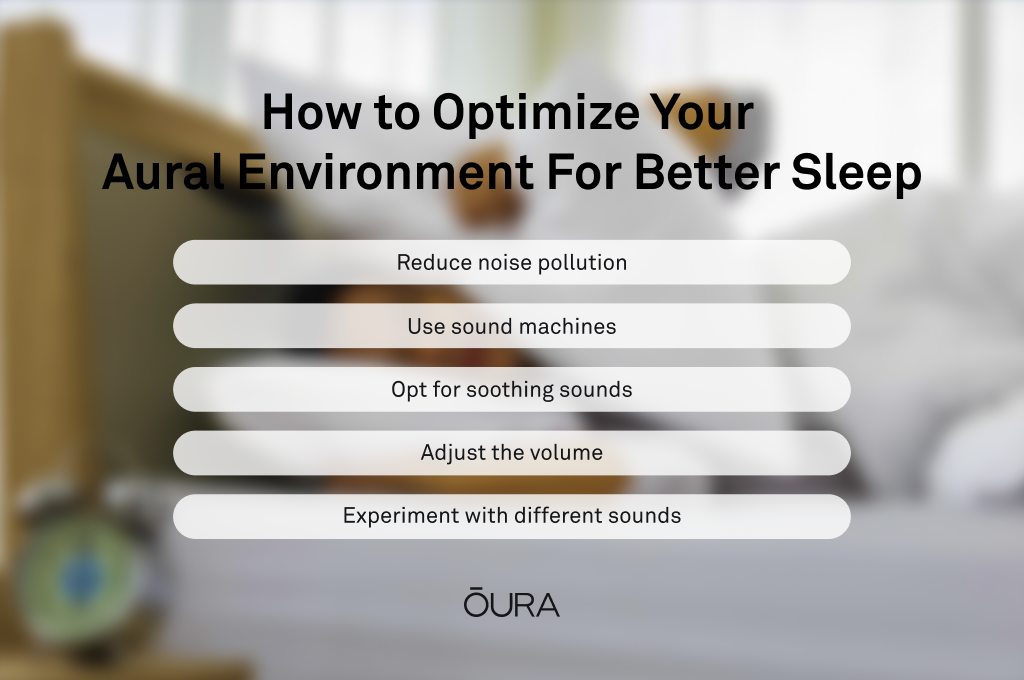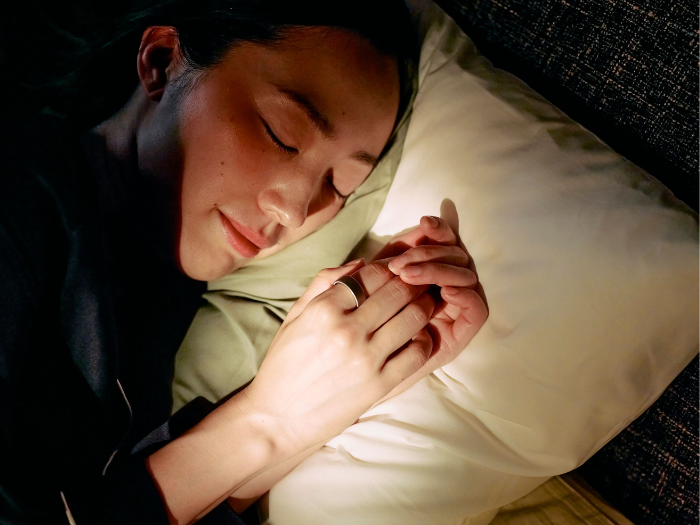If you find yourself struggling to fall asleep at night or waking up frequently, you’re not alone—and your sleeping background noise may have something to do with it.
One of the most overlooked factors in sleep quality is your aural environment, aka the background noise that surrounds you as you drift off. Whether it’s city traffic, a humming fridge, or the sound machine on your nightstand, these noises don’t just fade into the background. Your brain is listening, even when you’re not.
Below, learn about how background noise impacts your sleep, and what you can do about it, for deeper, more restful sleep.
RELATED: What Is Green Noise & Can It Help You Sleep Better?
How Does Background Noise Affect Your Sleep?
It’s easy to underestimate the impact of the noise around you, or maybe you are unaware of how even subtle sounds can affect the quality of your slumber. However, even when you’re asleep, your brain continues to register and process sound.
This means that even if you don’t consciously wake up because of a noise, it can still have a negative impact on your sleep quality. Research has shown that irregular sound can make it difficult to fall and stay asleep and disrupt your circadian rhythm.
That said, there are steps you can take to manage the impact of noise on your sleep. By understanding how background noise affects sleep and implementing some simple changes to the environment, you can create a more peaceful and restful space that promotes quality sleep.
What Is Your Aural Environment?
An aural environment is the total sum of sounds, both natural and man-made, that exist within a specific space, influencing our perception, feelings, and actions. It includes all the sounds you hear in your daily life—from the sounds of nature on your morning walk to the sounds of bustling city streets on your commute.

Your aural environment is made up of several different elements, each of which can significantly impact your sleep quality. Understanding these elements is crucial to creating a sleep environment that promotes relaxation.
Sound Levels
The volume of sounds present in your environment can significantly affect the quality of your aural environment. Loud and persistent sounds, such as traffic, construction noise, or even snoring, can disrupt your sleep and negatively impact your overall health and well-being. These sounds can cause your body to release stress hormones, leading to increased heart rate, blood pressure, and breathing rate, all of which can make it harder to fall and stay asleep.
Oura tracks nighttime heart rate variability, offering insight into your level of physiological stress during sleep.
Sound Types
Each sound has a unique impact on sleep quality. Some sounds, such as white noise or ambient sounds that are low-pitched and continuous, can help mask other sounds and promote relaxation. In contrast, sudden or sharp sounds like a car honking can startle you awake and disrupt your sleep.
READ MORE: The 7 Best Types of Sounds to Sleep By
Time of Day
If you hear people talking outside your window during the day, you may not even register it. But if you hear the same noise during the night, you may wake up abruptly. This is because our brains are wired to associate certain sounds with wakefulness and activity, and other sounds with relaxation and rest.
Personal Preferences
Finally, personal preferences play a role in the quality of your aural environment. Everyone has different preferences when it comes to sound, and what may be relaxing for one person may be disruptive for another.
For example, some people find the sound of rain soothing, while others may find it too distracting. Understanding your preferences and creating a sleep environment tailored to your needs can help promote better sleep quality.
By paying attention to the different elements that make up your aural environment, you can create a sleep environment that comes with several benefits.
READ MORE: Can Rain Sounds Help You Sleep?
What Are the Benefits of Sleeping with Ambient Background Noise?
The right kind of background noise can help you relax, rest, and feel better overall, which means you’ll sleep better too!

Improved Relaxation
Some sleeping background noises can promote relaxation and have a significant impact on reducing stress levels. For example, research has shown that listening to nature sounds, such as birds chirping or a waterfall, can lower cortisol levels—a hormone associated with stress. Similarly, white noise can help drown out background noise and create a peaceful atmosphere. Music therapy has also been found to be effective in reducing stress and promoting relaxation.
| Member Tip: Tag sleep noises like „white noise“ to see how it affects your Sleep Score. |
Improved Mood
Relaxing aural environments can have a positive impact on mood. For instance, listening to peaceful music can improve mood and decrease anxiety levels. Moreover, some research suggests that nature sounds seem to help reduce symptoms of depression. This is a positive cycle: better mood tends to lead to better sleep.
READ MORE: How Anxiety Affects the Brain—Plus 3 Science-Backed Ways to Manage It
Better Sleep
Sleep-friendly aural environments that promote relaxation can help improve sleep, making it easier to fall asleep and reducing the frequency of nighttime awakenings.
One study found that white noise reduced sleep latency (the time it takes to fall asleep after going to bed) by 38% compared to normal ambient noise.
Other research has also discovered that soothing music has a positive impact on sleep quality. In a study of older adults, those who listened to calming music for 45 minutes before bed experienced improved sleep quality and duration.
It’s clear that the right sleeping background noise can be highly beneficial to your sleep, but only when it’s optimized.
READ MORE: Why Sleep Matters
How to Use Background Noise to Your (Sleep) Advantage
Here are some ways you can optimize your aural environment for a better sleep experience:
Reduce noise pollution: When creating a sleep-friendly environment, reducing noise pollution is a crucial first step. This may involve using earplugs or noise-canceling headphones to block out disruptive noise, such as traffic or snoring. If you live in a noisy area, consider installing soundproof curtains or improving your insulation to minimize outside noise.
Use sound machines: Sound machines can be a great tool for promoting relaxation and masking other sounds that may disrupt sleep. When choosing a sound machine, consider the various types available, including white noise machines, nature sound machines, and music machines. You’ll want to go for a machine that best suits your specific needs and preferences.
| Member Tip: Look for the Sleep category within Explore content on the Oura App. This category features a variety of meditations and stories designed to help you prepare for sleep, each of which can be used with background soundscapes. Soundscape and spoken word volumes can be adjusted independently. |
Choose soothing sounds: When selecting sounds for your sleep environment, it’s important to pick ones that promote relaxation and calmness. Soothing sounds, such as rain, ocean waves, or soft instrumental music, can be particularly effective. Don’t shy away from trying new sounds and adjusting your sleep environment as needed. At the same time, you should avoid sounds that are too stimulating or loud, such as heavy metal music or car alarms.
READ MORE: What Is Green Noise & Can It Help You Sleep Better?
Adjust the volume: The volume of the sounds in your sleep environment is essential. The sounds should be loud enough to mask other noises but not so loud as to cause disturbances that will keep you up and negatively impact your sleep quality. It’s a good idea to try out different volume levels to find one that’s most effective for you.
Experiment with different sounds: Everyone is unique, and this extends to preferences when it comes to sound. As such, you should test out different sounds. You may discover that a combination of sounds, such as white noise and nature sounds, is most effective. Use Oura to track how certain behaviors, habits, and environmental factors affect your sleep.

READ MORE: Can Binaural Beats Help You Sleep Better?











